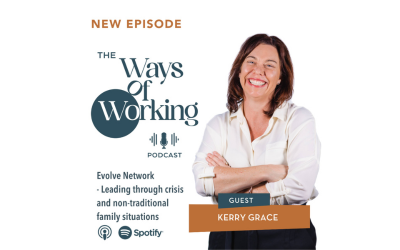Recently I spoke with Jimmy Burroughes about going through a break up and becoming a single mum while in a senior leadership position and what I learned from my experience that inspired the development of a truly family friendly workplace. (click on the image to hear the podcast episode)
Kudos to the board I worked for at the time (Regional Development Australia Mid North Coast) and particularly my most recent Chair, Kieren Dell for enabling me to do what needed to be done to ensure the workplace conditions not only suited my own situation, but also for me to enable a workplace that was in every aspect family friendly.
It’s easy to wave the ‘family friendly’ flag. Not so easy to be truly family friendly. My experience, and the observation of others has taught me the following about what it takes to create a work environment that can support staff through a break up – AND build a workplace that is truly family friendly.
An important note.
With over 40% of marriages breaking up (or breaking down) at some point (statistics will tell you as a manager to watch people who have been married for 11.2 years VERY closely), and no specific data on non-marriage unions let’s just agree that at some point you will have someone go through a breakup in your workplace.
Common sense will tell you that the better your organisation treats someone through a breakup, the more likely they are to stick around. And we all know that staff retention is critical to effective business operations.
So, what can you do as a manager of someone going through a break up, particularly when it’s a senior staff member?
When there’s a break up:
-
- Leverage on the trust you’ve built in the workplace to date which will ensure your team member will come to you to share the important information. Haven’t built the trust? Start today.
- Most marriages break down due to some form of emotional abuse or domestic violence. When someone discloses a breakup triage the situation. Is your team member safe? Are their children safe? Do they have somewhere to live? Do they need support to access services? Might they need a little bit of time out? Act accordingly.
- Offer access to your Employee Assistance Program (EAP) and if you don’t have one you can suggest things like:
- Supporting them to visit their GP to access the Mental Health Treatment Plan. This will entitle them to subsidised support with a psychologist (tele-support can also be utilised where there aren’t local psychologists – and in regional areas this is a real challenge).
- Offer access to sick days, family days or domestic violence leave
- Provide access to phone numbers such as LifeLine 131114 or 1800Respect (1800737732)
- Ask your person what THEY need right now
- Don’t let your own judgements cloud what happens next. While you may think the person needs time out, they may find working keeps their mind off things. Your role here is to ensure the workplace is safe for both them, and other team members
- Check in – but don’t become their counsellor, it’s not appropriate to overstep
- Reinforce the importance of team and keep the dialogue open
After the break up
- Again, keep your judgement out of it. In many cases the couple will reconcile, this is none of your business and you may find your employee is a bit sheepish on this topic.
- Ensure flexibility in your workplace and seek out ways to be flexible both in work hours, places of work and expectations (particularly before and after school hours when kids are involved).
- Check in and keep an open door policy enabling your staff member to speak with you as things unfold.
- Enable resources for professional development. While a psychologist may be required at some points, a performance or leadership coach could help to shift stubborn beliefs that someone may carry.
- Implement team building activities such as strengths coaching to better enable communication between team members.
- See this as a long term strategy and be prepared for things to change along the way.
- Reinforce your support of family friendly workplaces and encourage your staff member to be present for important family occasions.
Being supported through a break up and as a single mum in my workplace not only meant that I could continue in a senior leadership role for almost seven years, it also enabled me to grow as a person.
There are many ways to work and when we keep the human at the centre of our focus it’s much more likely that people will stick around.





